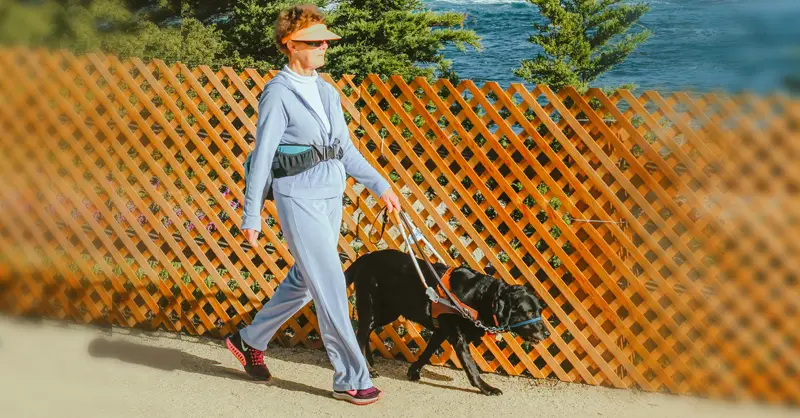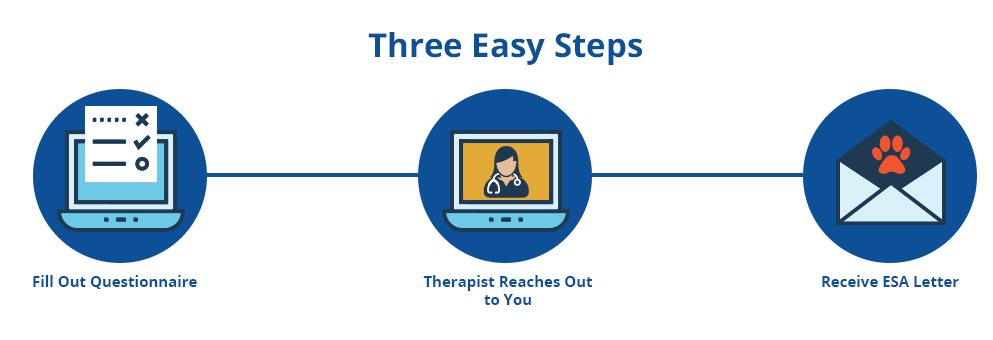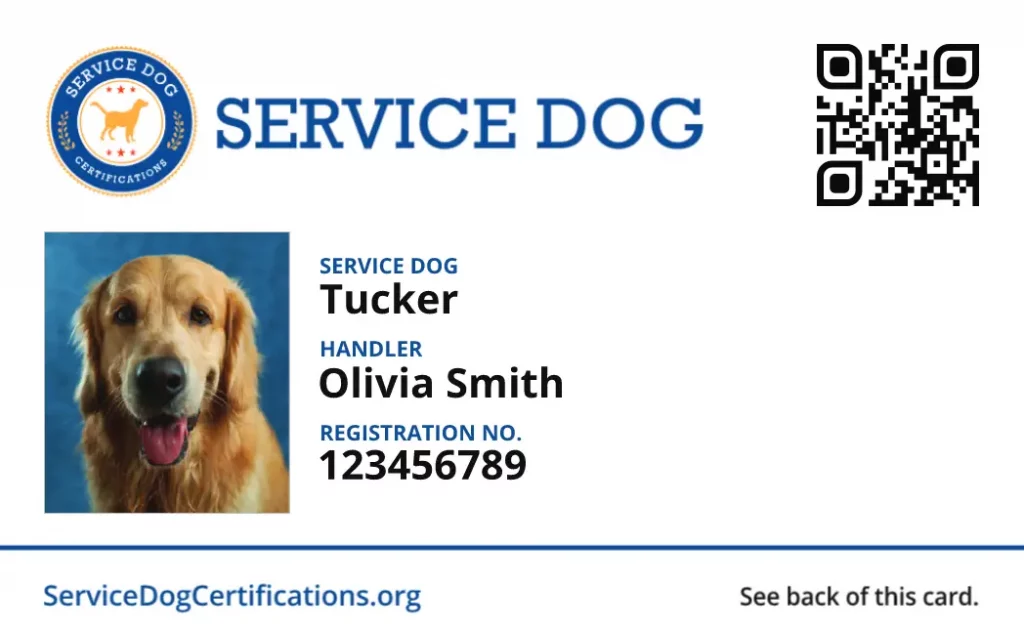Home Page › Blog › California Service Dog Requirements
California Service Dog Requirements

California allows people with disabilities to live, travel, and go about their daily lives in the presence of a service dog. Service dogs are afforded certain rights in the State of California that allow them to access public spaces that normally don’t allow pets.
Californians are protected by both federal and state laws, including under the Americans with Disabilities Act (ADA) as well as California’s Unruh Act (Civil Code, sections 51–51.2) and Disabled Persons Act (Civil Code, sections 54–55.32).
Read on for more information on California Service Dog requirements and regulations.
Definition of a service dog
Service Dog: Any canine trained to perform a disability-specific task for a person with a physical or psychiatric disability.
Service dogs used for mental health conditions are known as Psychiatric Service Dogs.
What is a disability: For legal purposes, disability is defined as a physical or mental impairment that substantially limits a major life activity (such as the ability to work, socialize, or attend school). Physical disabilities include health issues like limited mobility, visual impairment, seizures, and hearing loss. Qualifying psychiatric conditions include debilitating depression, chronic anxiety, PTSD, autism, and learning disabilities, among others.
How is a service dog trained?
To be considered a service animal, a dog must be individually trained to perform a job or task-specific to the handler’s disability.
Federal vs California rules: One difference between California’s rules and the ADA is that service dogs in training are not covered under the ADA. However, under the California Disabled Persons Act, individuals who train service dogs can bring their animals to any public place in order to train the dog and provide a disability-related service.
Who can train a dog: Dogs can be trained by the person with the disability, by a professional trainer, or with the help of a training organization. Note that in California, it is perfectly acceptable for a handler to train a service dog on their own.
Identification requirements for service dogs in California
Visible identification: Most service dog owners use service dog paraphernalia like ID cards, vests, tags, and certificates to signal to others in public that their dog is special. It is not mandatory either under California or federal rules to have an identification card or vest on your Service Dog, but handlers frequently use them for personal convenience. These items can prevent intrusive inquiries and unwanted interaction with the service animal while on duty.
Disability verification: Staff at venues and landlords cannot demand documentation as a condition of entry. In California, they can ask two questions to validate whether you have a service dog (and only if the disability is not obvious):
1. Is the animal a service dog required for a disability?
2. What work or task has the service dog been trained to perform?
Service dog registration in California
California does not require the registration of service dogs. There may be registration requirements that generally apply to all dogs that reside in your area, but they are not service-dog specific. Service dog owners, however, choose to voluntarily register their dogs for several reasons.
What it’s for: Registering a service dog with a service like Service Dog Certifications enters the dog’s information into a searchable database linked to an ID card. The ID card can be used as one way to signal to others that you own a service dog or be presented when third parties unaware of service dog verification rules continually insist on seeing documentation.
Psychiatric service dog requirements
Psychiatric service dogs are recognized as service dogs in California with all the same rights and benefits of ownership.
Psychiatric service dogs are still not well appreciated by the general public but are a growing category of assistance animals.
California considers the following as psychiatric disabilities if they substantially limit a major life activity:
- Post-Traumatic Stress Disorder
- Anxiety Disorders
- Depression
- Obsessive-Compulsive Disorders
- Personality Disorders
- Schizophrenia and Schizoaffective Disorder
- ADHD
- Autism
Psychiatric service dogs can perform an amazing number of tasks, including:
- Deep pressure therapy
- Reminding the owner to take medication
- Posting and watching the owner’s back in open areas
- Tactile stimulation
- Alerting the owner to oncoming threats or episodes
- Disrupting repetitive self-destructive behaviors
Service dog vs emotional support dog in California
California also recognizes emotional support animals as a type of assistance animal. An emotional support animal (ESA) alleviates symptoms of a mental or emotional health condition.
SD vs ESA: There are major differences between ESAs and service dogs.
- ESAs do not require any specialized training.
- ESAs are protected under the Fair Housing Act, not the ADA, so the benefits extend primarily to housing rights and do not come with public access rights.
- While service dogs can only be dogs, ESAs can be dogs, cats, birds, gerbils, fish, turtles, and other small household pets.
To qualify for an emotional support animal in California, you need an ESA letter from a California-licensed mental health professional. See if you qualify for an emotional support animal letter by completing the online questionnaire below.

You and your service dog in California
Service Dog handlers in California have generous rights. These include:
- Public access (venues, outdoor areas, etc.)
- Access to public transportation
- Access to aviation (including in the cabin on airplanes)
Having a service dog in California is a major responsibility. Properly training a service dog can be challenging, and service dog owners are expected to have their animals under control at all times. Of course, as a reminder, California law prohibits misrepresenting a pet dog as a service dog.
As a service dog owner, it’s important to be aware of your rights and how to conduct yourself during proper service dog verification requests by third parties. Registrations, certificates, ID cards, tags, and vests can’t replace these procedures, but they can help ease the process and give the public an easy way to recognize your companion as a service dog.
About the Author: The writing team at Service Dog Certifications is made up of folks who really know their stuff when it comes to disability laws and assistance animals. Many of our writers and editors have service dogs themselves and share insights from their own experiences. All of us have a passion for disability rights and animals.
135 comments
Leave a Reply Cancel reply
Latest Posts

How to Bring a Service Dog to Disneyland
Trained service dogs are more than welcome to join their handlers at Disneyland. In this guide, we’ll explain Disneyland’s policies and give practical advice for bringing a service dog to Disneyland for the first time. Disneyland’s Service Dog Policies The Magic Kingdom is happy to welcome trained service dogs across most park locations! They kindly […]

Read More

Can Dogs Eat Tomatoes?
Yes! Dogs can safely enjoy tomatoes, but there are a few risks to be aware of so you can feed your dog responsibly. Fully ripe tomatoes (without the stems and leaves) can actually have nutrients that are good for your pup. Tomatoes have chlorogenic acid, an antioxidant that can have anti-inflammatory effects in cells. They’re […]

Read More

Can a Primary Care Doctor Write an ESA Letter?
Your family doctor, also called a primary care physician (PCP), can write a letter recommending an emotional support animal. We’ll explain what legally gives them that ability and explore what better options might be available for you. Why are Physicians Able to Write an ESA Letter? To turn your pet into an emotional support animal, […]

Read More









I have hearing problems and need to register my two (2) dogs as Service Animals. Through their barking I know when someone is knocking on the door or if the phone is ringing or I they hear strange noises in front or behind my house (day or night) or if they hear any sound that isn’t normal for them.
They sleep in the same room where I sleep and when they start barking or running towards the source of the noise I try to check myself to make sure which is the reason or if everything is okay.
I’m 73 years old and have trouble walking because my arthritis is very advanced, but I have a big yard where they can run whenever they want.
They have their license and vaccinations up to date.
I have a letter from my Doctor. I don’t know where or to whom I should contact to start the process, since my dogs help me with my hearing loss in many, many ways…!!!
Any help you can provide me on this matter will be greatly appreciated
You cannot qualify for a service dog by registering it (that can only be done after you have a service dog, and is at the handler’s option). To qualify for a service dog with hearing loss, your condition must be considered an eligible disability. It seems you may have already discussed that with your doctor. If you have confirmed that, the next step would be to ensure your dogs are properly trained to perform tasks relating to your disability. If you’re unsure about the training aspect, we recommend seeking the help of a professional trainer.
In order for a dog to be a service dog they must have been trained in tasks that are not just normal dog behavior. For example, if you trained the dog to nudge your hand when someone knocked on the door that would be a task, but just barking at noises because it is what comes naturally to them is not a task. If you feel you need a service dog, you should reach out to a local trainer and ask them if they can do an assessment to see if either dog has the temperament to be trained as a service dog. You can then use a trainer, or try and train the tasks yourself…
“It is not mandatory either under California or federal rules to have an identification card or vest on your Service Dog …” This enables anyone to bring a dog into a public space building without any need for a “service” designation. The burden is on the inquirer, not the owner of the dog to demonstrate proof. Building managment is liable for denying service if indeed the animal is a “service” animal. The bottom line is that anyone who wants to bring any dog into a commercial establishment can do so at will with little risk of a challenge. The law should require identification to prevent flagrant abuse.
This is a controversial issue. Some argue that an ID card would help prevent fraud, while others say it would create an undue burden and added expense for service dog owners. Currently ID cards are optional for service dog owners.
I give workingservicedogs. A five paw acknowledgement for the great new mesh vest my Emmie just received
She is my mobility service dog. She takes on my left side as my left leg is weak and wobbly. She steadies me supports me if I start to loose balance. She is right there on my left side to wait til I can get balance back
She is my fifth Bernese mnt dog who have in so many ways over the past 25 years taken care of me
Sherri Carroll
Half moon bay. California
So, one person carrying a small dog is let into the art gallery having an emotional support certificate.
Another person carrying a similar small dog, without a certificate is not let in.
The first person applies for a cert but really doesn’t truly have the need for it, but they can take the dog everywhere with them.
The second person doesn’t need a cert but is honest and doesn’t fake the application.
So, the honest person is penalized and is restricted from carrying the dog inside the gallery, even though
the two behaviors are exactly the same.
Do you realized how screwed up this law is.
There are a few misconceptions in your comment: 1. emotional support animals don’t have public access rights to places like galleries, even legitimate ones. 2. You can’t qualify for an emotional support animal by having a certificate, you need an ESA letter from a licensed healthcare professional. This link has more info on ESA letters: https://www.servicedogcertifications.org/how-to-get-an-emotional-support-dog-letter/
It’s about knowing Laws per to and doing research prior to using the service animal and there should be a lot more laws preventing fake service dogs to protect the ones that are actually needed I’ve had a service dog for 15 plus years and it is a legit service dog and I’ve had to pick up slack from other people and their fake service animals not fair not fair at all!!!!!!!!!!!
My service dog help’s me get out of my seizures and she never bark’s she was a rescue dog at first and we got her this in march but she is very smart.